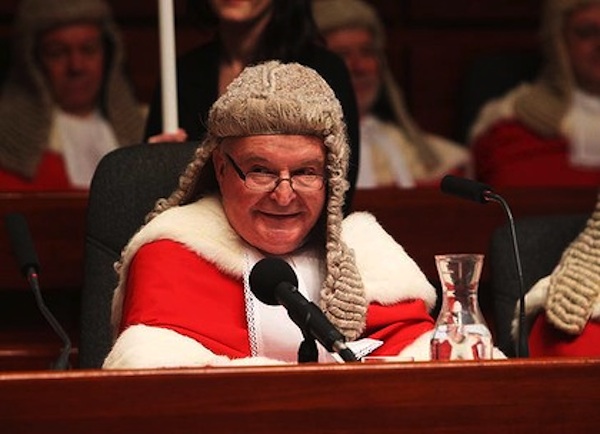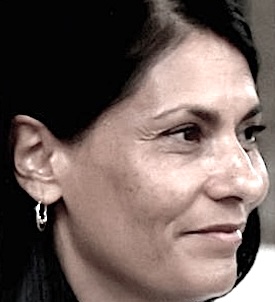Bathurst backdown on "drones"
 Artemus Jones •
Artemus Jones •  Friday, May 18, 2012
Friday, May 18, 2012 Tom Bathurst, chief justice of NSW, is punished for speaking the truth ... In the face of an outpouring of indignation from the usual suspects he modified his "mindless drones" criticism of large law factories ... Artemus Jones, who is not unfamiliar with dronery, leaps to the CJ's defence
 Bathurst CJ: set off complaints from defenders of the faith
Bathurst CJ: set off complaints from defenders of the faith
HOW unfortunate that Chief Justice Tom Bathurst felt obliged to modify his remarks about legal ethics, made in a speech to the Commonwealth Law Association.
Bathurst now says he used the wrong term when he described large law firms dedicated to billable hours as being occupied by "mindless drones".
He now says it would have been more accurate to have said "mechanical drones".
Twenty years ago such a backdown would not have been necessary.
Bathurst's address concerned the topic of legal ethics and the marketplace. The topic, one would have thought, would have been uncontroversial and has been the subject of extra-judicial comment by judges, and others in the profession, for decades.
In the 1950s Owen Dixon noted a decline in professional standards and expressed concern that this trend would lead to the community no longer reposing trust and confidence in the legal profession.
In 1996 Justice Michael Kirby expressed the fear that, "the mercantile values of ruthless self-interest may permeate Australian legal practice".
In the same year, Chief Justice Rehnquist of the US Supreme Court observed, "the practice of law today is a business where once it was a profession ... market capitalism has come to dominate the legal profession in a way that it did not a generation ago".
In a 1999 article titled, Are the professions worth keeping?, Chief Justice Gleeson spoke of "the powerful centripetal force of commercialism [which has] affected so many aspects of our lives ... that nothing seems to be immune, least of all professional life".
From the 1970s until his death, R.P. Meagher spoke often about his concern that the values and standards which underpinned the law as a profession were being eroded.
In October 2005, Bret Walker SC delivered a powerful speech in which he said:
"Excessive proximity to business clients, and their money, seems to have produced elements of imitation [on the part of lawyers] unlikely to enhance professionalism."
Chief Justice Bathurst's address, therefore, fell within a well-defined category of extra-judicial discourse and, in many respects, it was quite tame.
For example, in placing blame for undesirable aspects of contemporary legal culture solely on large law firms, the Chief Justice was being unduly kind to smaller firms.
He also exempted the bar from his criticisms.
Unfortunately, the culture that he criticised is pervasive. It permeates small law firms as well as sections of the bar.
Nor did the CJ draw attention to other causes of the decline of the law as a profession.
For example, the ineffectiveness of professional bodies in imposing sanctions on members who breach ethical codes (e.g. the Keddies debacle); the advent of corporate structures for law firms; the appointment of second-rate lawyers to judicial office; the ongoing failure of politicians to properly fund the judicial system; and the poor quality of legal training provided by universities and the profession generally - to mention but a few.
Bathurst did, however, criticise the corporate culture that infects the practice of law and expressed concern at the effect this was having on young lawyers.
He noted that so toxic is this culture that many bright graduates seek to avoid it, and do so.
What fired the controversy was his proposition that many young lawyers who embrace this money-driven culture and work within it become "mindless drones".
Immediately, he faced a barrage of criticism - from those very institutions that have made possible the rise of the culture Bathurst deplored - namely the Law Council of Australia, various Legal Services Commissioners and more recently the Law Society of NSW.
The term "mindless drone" is an entirely accurate description of many of the lawyers who uncritically accept the current legal culture.
Obviously not all lawyers are "mindless drones", but there is no doubt that the drones now predominate and their numbers increase daily.
Just look at the characteristics of this environment - including:
- An almost exclusive focus is on billing - that is making money;
- Little or no respect for knowledge of the law - an anti-intellectual attitude;
- Little or no regard for clients' real interests;
- A lack of judgment, practical or otherwise;
- A youth focused obsession;
- It's intolerance - brooking no criticism or dissent;
- Its top-down corporate clique leadership - partnerships in any real sense no longer exist;
- Its lack of loyalty, either within the firm or to clients;
- Its fostering of ultra-competitiveness between employees;
- Its creation of a truly appalling culture of inter-personal relations - as exposed in the recent Styles litigation;
- It abolition of all personal satisfaction in achievements, other than a crass delight in billing more than one's fellow employees.
In short, it is a culture of the marketplace, without strong ethical values or constraints. It is, therefore, incompatible with the notion of a profession.
If people doubt this, and the aptness of the term "mindless drone", can I suggest that the next time they are having a drink with a lawyer, who they think may be a drone, ask them who Cyril Walsh was or what the definition of a profession is.
Why then has Chief Justice Bathurst backed-down in the face of self-interested criticism - withdrawing "mindless drones" and replacing it with "mechanical drones" (which is hardly more complimentary)?
In any event it is tautological to describe a drone as either "mindless" or "mechanical". Drone all by itself would have been fine.
I think there are two reasons for the CJ's capitulation.
First, he dared to criticise a dominant legal culture, which will not tolerate criticism. The custodians of the culture reacted accordingly.
I suspect Bathurst would have been surprised by the reaction, and sought to effect a compromise. That is perfectly understandable, but has undesirable consequences.
Secondly, the Chief Justice had contravened (inadvertently) the doctrine of political correctness, which is the dominant intellectual current pervading Australian society.
That doctrine holds that no value judgments (save for approved ones) can be made and that no criticism of any culture, person or group (save again for approved criticisms) are to be permitted.
Further, any person who makes an unapproved criticism, unless an apology is immediately forthcoming, is to be attacked mercilessly. Confected media outrage also plays its part.
The Chief Justice has simply done what the doctrine of political correctness has required of him.
It is disappointing that he felt he had to declare he had used the wrong term. The points he was making need to be made by a person of his stature.
Owen Dixon pointed out:
"Experience has shown in every age that a profession cannot proceed without high professional standards ... unless high standards of conduct are maintained by those who pursue a profession ... the function itself of the profession is frustrated."
So too the dictates of political correctness must be resisted. As Justice R.P. Meagher never tired of pointing out, political correctness is the enemy of independence and all genuinely critical thought.
It's worth remembering what Queensland Supreme Court judge Henry Fryberg said in a 1997 judgment:
"Solicitors are professional persons first and business persons last ... Solicitors ... must look first to the law to determine their obligations and behaviour. If their legal obligations do not accord with the fashionable theories of human behaviour in the market place they must be as unfashionable and with as much fortitude as they can muster."
Artemus Jones - Dieppe
 Drones,
Drones,  Ethics,
Ethics,  Tom Bathurst
Tom Bathurst 









Reader Comments